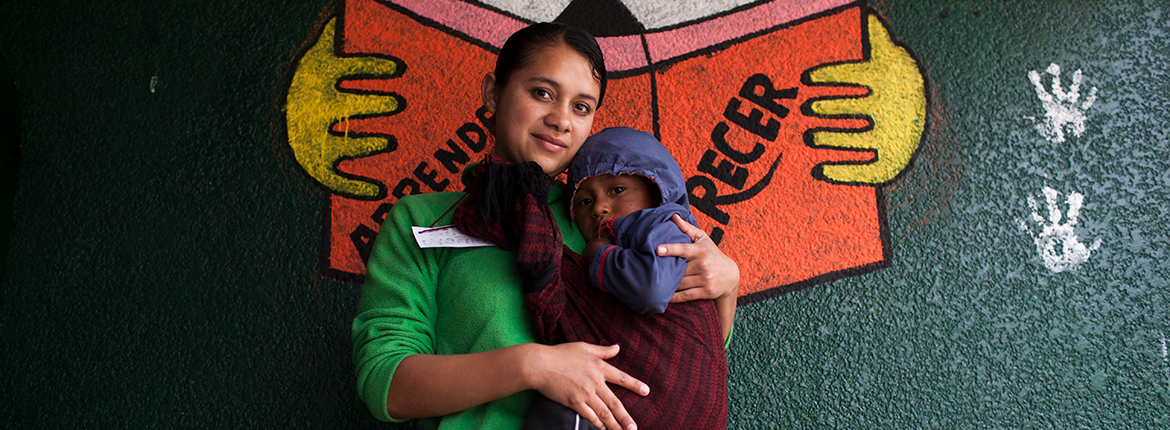

Promovemos el bienestar físico y psicológico de las y los niños
En varias ocasiones se han publicado artículos sobre el trabajo infantil en Guatemala, relacionados a la producción de café. Este es un tema altamente preocupante, que sólo puede abordarse desde la comprensión objetiva del porqué de la presencia de menores de edad en los cafetales. La Organización Internacional del Trabajo define el trabajo infantil como un trabajo que es mental, física, social o moralmente perjudicial para los niños e interfiere con su escolarización. Además, establece la edad mínima general para el empleo en 15 años, pero permite el trabajo ligero a partir de los 13 años bajo ciertas condiciones.
En el año 2019 se realizó una investigación en fincas y comunidades cafetaleras en la región del Trifinio, en el cual el equipo de Coffee Care tuvo participación, con el objetivo de comprender los aspectos económicos y socioculturales que motivan esa presencia de niños en los cultivos. Esto para entonces poder generar las condiciones que propiciaran que los niños, hijos de cortadores y productores de café, tuvieran entornos de crecimiento, recreación y educación adecuados.
Los resultados de esta investigación respaldaron la congruencia de los proyectos de Coffee Care, ya que, sin bien es cierto que a través del hacer es como muchos padres consideran la forma más apropiada del aprendizaje, es importante que se fortalezca y priorice la educación escolar de sus hijos, su nutrición y el fomento de aspectos como su autoestima. Estos pilares son precisamente los fundamentos de proyectos como las Kitas (guarderías abiertas durante la cosecha de café), los distintos programas de becas (TOS y R10), así como la implementación de Abriendo Oportunidades y el Tchibo Coffee Club.
Para conocer más de estos proyectos, se pueden consultar nuestros informes anuales http://coffeecare.com.gt/reports/ o seguirnos en nuestras redes, pero lo más importante es que en Coffee Care fundamentamos las propuestas de intervención en data objetivamente recolectada, sin sesgos mediáticos o políticos, como sucede muchas veces.
Compartimos información interesante recopilada y analizada en la investigación anteriormente mencionada.
Para los padres de familia el trabajo es un valor que los niños deben adquirir. A través del trabajo aprenden los oficios de la caficultura, adquieren disciplina y responsabilidad, y aportan a la economía familiar.
Por la época de cosecha, la presencia de los niños en los cafetales no es necesariamente sinónimo de ausentismo escolar; ya que gran parte de la época de cosecha coincide con las vacaciones escolares. En todos los casos, cuando los niños trabajan junto a sus padres, son los padres quienes reciben el dinero que la familia ganó. Ellos organizan los gastos. Comúnmente los padres les entregan a los niños una pequeña cantidad que gastan en golosinas o artículos de su interés.
Continuaremos fomentando la caficultura, su tradición de heredarla de generación en generación, siempre y cuando se protejan el bienestar físico y psicológico de los niños .
We Promote the Physical and Psychological Well-Being of Children
Several articles have been published about child labor in Guatemala, specifically related to coffee production. This is a highly concerning issue that can only be addressed by understanding the objective reasons behind the presence of minors in the coffee fields. The International Labour Organization defines child labor as work that is mentally, physically, socially, or morally harmful to children and interferes with their schooling. Additionally, it sets the general minimum age for employment at 15 years but allows light work from the age of 13 under certain conditions.
In 2019, a study was conducted on farms and coffee-growing communities in the Trifinio region, in which the Coffee Care team participated. The objective was to understand the economic and sociocultural aspects that motivate the presence of children in the fields. This was done to create conditions that would provide children, the sons and daughters of coffee pickers and producers, with appropriate environments for growth, recreation, and education.
The results of this study supported the consistency of Coffee Care’s projects. While many parents consider hands-on work the most appropriate form of learning, it is important to strengthen and prioritize their children’s schooling, nutrition, and the promotion of aspects such as self-esteem. These pillars are precisely the foundations of projects like the Kitas (daycare centers open during the coffee harvest), various scholarship programs (TOS and R10), as well as the implementation of Abriendo Oportunidades and the Tchibo Coffee Club.
To learn more about these projects, you can consult our annual reports at http://coffeecare.com.gt/reports/ or follow us on social media. However, the most important thing is that at Coffee Care, we base our intervention proposals on objectively collected data, without media or political biases, as often happens.
We share interesting information collected and analyzed in the aforementioned study.
For parents, work is a value that children must acquire. Through work, they learn the trades of coffee farming, gain discipline and responsibility, and contribute to the family economy. During the harvest season, the presence of children in the coffee fields is not necessarily synonymous with school absenteeism, as much of the harvest season coincides with school vacations.
In all cases, when children work alongside their parents, it is the parents who receive the money the family earns. They manage the expenses. Commonly, parents give the children a small amount to spend on treats or items of their interest.
We will continue to promote coffee farming and its tradition of passing it down from generation to generation, as long as the physical and psychological well-being of children is protected.
